A business leader recently asked this question. “It has been such a grind for so many months, sometimes I feel like I am going to blow a gasket. How can I find or create space to think beyond the day to day?”
I responded, “Do you know your point of enough?” He said, “Yes, but sometimes it is too late, and I have already gone beyond that point and I lose my cool.” The same day, I experienced my “point of enough.” I participated in zoom meetings from 7 a.m. – 4 p.m., and did not take the time to walk outside, get fresh air, eat healthy food, or get re-energized. During the last meeting, I was asked a question and had difficulty coming up with a clear answer. My brain was full of cotton, and there was no space to be creative or think. I was present, but getting crabby, and I was not able to give 100%.
We have all heard the phrase, “know thyself,” but you may not be aware of its origin or successive statements. The Ancient Greek aphorism “know thyself,” is one of the Delphic maxims. It is the first of three maxims inscribed in the forecourse of the Temple of Apollo at Delphi, according to the Greek writer Pausanias. The two maxims that followed “know thyself” were, “nothing to excess” and “surety brings ruin.”
NO KIDDING, excess and ruin! This was the outcome that I experienced.
This phrase helps provide direction to manage your emotions, situation, and yourself. The key is knowing your “enough triggers.” These are the behaviors and/or scenarios that may send you over the edge. Sometimes, it is the behavior of another person. Sometimes, you do not get enough sleep, or you are hungry. Sometimes, a person does not do what they say they will do, and you were depending on them to finish your project. Sometimes, your puppy has an accident on the floor. You get the picture.
Take a minute and identify your “enough triggers.”
When you know your triggers, you can be aware of them bubbling to the surface so you can anticipate and manage them. This emotional awareness helps you to be proactive vs. reactive in a situation. When you ignore the triggers and believe you can do just a bit more, you may experience a “meltdown” and have a reaction that does not represent your “best self.” Your response may not be the result of the other persons actions, any judgement used may not be deserved. Knowing your triggers and “point of enough” can save employee interactions, teamwork, customer relationships, creativity, and your sanity.
When you feel the wave starting to crash, get up and take a quick walk, or work on a different project to change your point of view. Be aware of what helps you successfully move through these trigger moments, i.e., a walk, a glass of water, fresh air, taking a pause, etc. Make a mental or physical note so that you can repeat these behaviors in the future.
In the situation previously mentioned, I did not pay attention to my triggers. Rather than functioning on autopilot, I could have taken a quick walk around my house before my meeting, and/or not picked up the next call. To combat this, schedule ten minutes in between meetings to breathe and clear your head. If you automatically take a call ask, “May I call you back in ten minutes so that I can clearly focus on your question and topic?” Every time I have used this phrase, the person on the other end said, “Of course” and viewed it as being respectful of their time. I indicated that they have value, and I wanted my interaction to be meaningful and productive.
Every person, relationship, team, company, or brand has a “point of enough!”
Last week some iconic brands communicated a change of plans related to their participation in Superbowl. Budweiser, Coke, and Pepsi have decided to opt out of the Superbowl ads and instead reallocated some of the money used for a commercial to raise public awareness about COVID. Many people have hit the “point of enough” when dealing with aspects of the pandemic, i.e., working from home, home schooling, wearing masks, distancing, and facing fear about the unknown, etc. But we are still in the pandemic, and these companies believe awareness and safety will bring us back together more quickly to enjoy their products. Good decision that sends a strong message.
The “point of enough” may be an indicator of a change in direction or evolution for your company or brand. This is not a message of settling for “just enough,” instead it is a message of change. In 2020, businesses were forced to examine their model to identify and anticipate their “point of enough”. Some businesses introduced new processes, roles, products, policies, and methods, while others decided “enough was enough.”
Share this idea with your team. Encourage them to know and manage their “enough triggers.” If you are in a meeting and the team is starting to fidget, lose attention, or get cranky, you can take a quick break or introduce a thought-provoking question to change focus and re-energize. An example of a question might be, “What did you do last week that was fun and made you laugh?” This puts people in a joyful mood, and the room is filled with laughter and smiling participants.
“He who knows others is wise, he who knows himself is enlightened.” Lao Tzu – Ancient China Philosopher 400BC – 531BC
